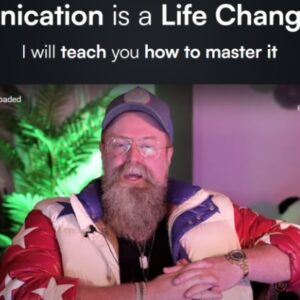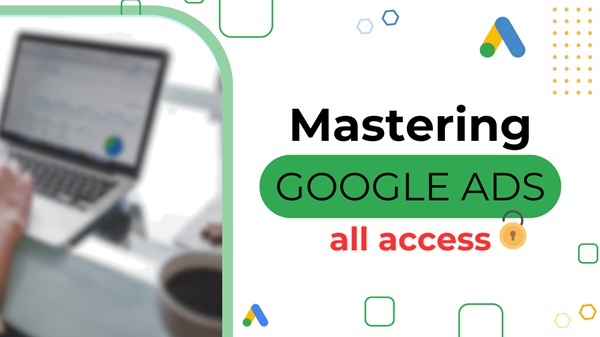Mastering Google Ads All Access – Aaron Young
$899.00 Original price was: $899.00.$22.00Current price is: $22.00.
- Delivery: You Will Receive A Receipt With Download Link Through Email.
- If you need more proof ofcourse, feel free to chat with me!

Description
Table of Contents
ToggleProof of the course:

The landscape of digital advertising, particularly concerning Google Ads, has undergone a monumental shift, making a foundational understanding of google ads core principles more critical than ever for sustainable success. This transformation demands not just updated tactics, but a return to the underlying truths that govern effective, profitable campaigns.
Google Ads Core Principles
The very essence of effective Google Ads management revolves around establishing a robust foundation, one that is resilient to the volatile changes of the digital world and impervious to the superficial allure of fleeting ‘hacks’. At its heart, mastering Google Ads means embracing a systematic approach, deeply rooted in fundamental principles that digital marketing expert Aaron Young, through his “Mastering Google Ads” course, meticulously dissects and delivers. This course posits that the Google Ads platform has fundamentally changed, rendering outdated strategies ineffective, primarily due to the ubiquitous rise of conversational AI in everyday search. This mandates a fresh perspective, anchoring advertisers to google ads core principles that transcend mere platform mechanics.
The Foundational Triumvirate: Keywords, Ads, and Landing Pages
The bedrock of any profitable Google Ads campaign, and indeed a central tenet of google ads core principles, rests upon a triumvirate: targeting the right keywords with the right ads and directing traffic to high-converting landing pages. This isn’t just a marketing slogan; it’s a meticulously developed philosophy derived from 15 years of exhaustive experience, managing monthly ad spends ranging from $1,000 to over $750,000 for industry giants like Suzuki, Omega, and Swisse. The course philosophy rejects simplistic notions in favor of a profound understanding of user intent, emphasizing that clicks alone are insufficient; quality engagement that leads to conversion is the ultimate goal. Without a deep mastery of these three interdependent pillars, campaign success remains elusive, often leading to wasted ad spend and diminished returns.
Beyond the surface-level understanding of merely picking keywords and writing copy, the integration of conversational AI into Google searches has further complicated this foundational step. Users are now interacting with search engines in more nuanced, natural language queries, demanding a more sophisticated approach to keyword research and ad copy creation. The era of broad matching or generic ad copy yielding easy results is unequivocally over. Advertisers must now delve into the psychology of search intent, understanding the implicit questions and desires behind conversational queries, to craft ads that not only capture attention but genuinely resonate with the user’s immediate need. This requires not just diligence but a dynamic, updated strategy that reflects the shifting paradigm of how people discover information and solutions online, moving far beyond the mechanical matching of terms.
From a personal and analytical perspective, the enduring power of this foundational triumvirate is that it transcends platform updates or algorithm changes. While the how might evolve—requiring new keyword research techniques, more dynamic ad formats, or advanced landing page optimizations—the what remains constant: connect the right intent with the right offer on an optimal destination. Many so-called “untested hacks and tricks” prevalent in the market are short-sighted precisely because they attempt to bypass one or more of these core elements, seeking quick wins that inevitably crumble. Aaron Young’s curriculum, by anchoring firmly to these google ads core principles, empowers advertisers to build campaigns that are not only profitable today but are also adaptable and sustainable for the long haul, thereby fostering true scalable growth rather than fleeting spikes in performance.
Navigating the Evolving Landscape: Why Foundational Principles Endure
The central argument for the necessity of a structured program like “Mastering Google Ads” is the radical and often disorienting transformation of the Google Ads environment. We are no longer operating in an era where simple keyword and ad copy combinations guarantees easy results; that particular golden age is described as long gone. The primary driver of this profound change is the pervasive integration of conversational AI into everyday Google searches, fundamentally altering user search behavior. This shift demands a radical new strategic approach to advertising, one that moves beyond traditional keyword matching to anticipate and respond to the fluidity of human language and intent. The understanding of these deeper dynamics is a critical aspect of grasping google ads core principles.
A significant challenge for contemporary advertisers is navigating the overwhelming plethora of available strategies advertised across countless videos and blog posts. Much of this widely disseminated information, according to the source material, is often untested, comprising mere theories rather than validated strategies. This “problem of misinformation” contributes to widespread confusion, where advertisers attempt to piece together a coherent plan from disparate and unverified sources, invariably leading to underwhelming business results. The course critiques this piecemeal approach, positioning itself as a “single trusted source” that offers a clear, step-by-step process built upon core, proven principles, thereby rejecting the short-term, viral-content-driven “hacks and tricks” in favor of sustained success.
From a critical analysis, the endurance of foundational principles, even amidst radical technological change, is a testament to their intrinsic value. While the tools and interfaces of Google Ads may evolve, the underlying human psychology of search and purchase intent remains remarkably consistent. A deep understanding of these google ads core principles—how users search, what motivates them, and how to effectively present solutions—allows advertisers to adapt to new platforms and features rather than being perpetually reactive.
Aaron Young’s curriculum, covering everything from Google Ads Fundamentals to Campaign Strategy and Optimization Frameworks, meticulously builds this adaptability, enabling students to interpret platform changes through the lens of proven efficacy. This systematic framework, far from being rigid, provides the intellectual agility required to thrive in the constantly shifting “2025 advertising landscape,” transforming a fragmented landscape into a fertile ground for structured growth.
The Architect of Profitability: Aaron Young’s Systematic Approach
The authority and effectiveness of the Mastering Google Ads course are profoundly rooted in the extensive experience and formidable credentials of its creator, Aaron Young, a self-proclaimed Google Ads nerd. His journey began in 2010, launching his very first Google Ads campaign for his own business, a testament to his entrepreneurial spirit and hands-on understanding. With 15 years of dedicated experience managing Google Ads campaigns, Young has navigated the full spectrum of budget management, from humble beginnings under $1,000 per month for small local businesses to overseeing colossal expenditures exceeding $750,000 per month for prominent multinational brands such as Suzuki, Omega, and Swisse. This breadth of experience across diverse industries and scales underscores his unparalleled mastery of google ads core principles and their practical application.
Young’s systematic methods are not merely theoretical constructs; they are the distillation of years of in-the-trenches work, meticulously integrated into a “step-by-step process” within the course curriculum. This approach encompasses every critical aspect of campaign management, from foundational account structure to advanced optimization and scaling. A distinctive highlight is the inclusion of proprietary tools, ingeniously built in collaboration within the Define Digital Academy framework, specifically designed to automate and enhance adherence to these core principles.
For instance, the AI Smart Bidding Script is provided to students, acting as an intelligent agent to optimize bids based on real-time data and campaign objectives. Furthermore, the Smart Bidding Analysis Prompt, developed in collaboration with industry veteran Mike Rhodes of Build The Agent, equips users to dissect and understand complex smart bidding strategies, ensuring they are implemented correctly to avoid potential negative outcomes and maximize profitability—a direct application of google ads core principles in an advanced context.
The impact and reach of Aaron Young’s educational initiatives are extensive, solidifying his position as a leading authority in the Google Ads space. In 2022, he founded the Define Digital Academy with the express purpose of teaching profitable Google Ads management, transforming his vast knowledge into an accessible structured learning path. His influence extends to YouTube, where he maintains the largest Google Ads Only channel, boasting over 95,000 subscribers and serving as a public repository of valuable insights.
Through his courses, he has instructed over 5,000 students, and his commitment to individualized guidance is evident from having conducted over 1,000 individual Google Ads coaching calls. This multifaceted engagement underscores how his “Mastering Google Ads” course is not just a collection of lessons but a living, evolving masterclass in applying google ads core principles for both beginners seeking direction and experienced managers aiming for sophisticated, scalable results.
3 Principles of Google Ads
Understanding the fundamental shifts in the Google Ads environment requires more than just adapting to new features; it necessitates a return to the unchanging truths that drive success. Aaron Young’s “Mastering Google Ads” course distills this complex reality into a clear, actionable framework, emphasizing that profitable campaigns are built upon a distinct set of foundational parameters. These aren’t merely guidelines, but what can be accurately articulated as the 3 principles of google ads, each critical for creating, optimizing, and scaling campaigns that deliver consistent, positive returns in the dynamic advertising landscape, especially as we look towards 2025.
Principle 1: Precision Targeting Through Intent-Driven Engagement
The first of the 3 principles of google ads centers on precision targeting: connecting the right offer with the right audience at the precise moment of intent. This begins with mastering “Keyword Research” in an environment largely reshaped by conversational AI. Outdated strategies that relied on broad or exact match keywords in isolation are no longer sufficient. The course teaches tested and updated keyword strategies that are effective in today’s changed search environment, requiring a deep dive into understanding user queries, including long-tail and natural language searches, to uncover genuine intent. It’s about anticipating what users are truly looking for, moving beyond surface-level keywords to the underlying needs and problems they seek to address.
Beyond keywords, this principle extends to “Ad Copy Creation,” described as a highly undervalued skill. The curriculum reveals the four core elements required for ad copy to generate not just clicks, but crucially, conversions. This involves crafting compelling headlines and descriptions that resonate directly with the researched keyword intent, evoking engagement and clearly communicating value. In a world saturated with information, an ad must cut through the noise by being hyper-relevant and persuasive, acting as a direct extension of the user’s search query. It’s the critical bridge between capturing attention and prompting further action, making the quality of ad copy a cornerstone of any successful campaign relying on google ads core principles.
From a strategic perspective, adhering to this principle of precision targeting through intent-driven engagement is paramount to reducing wasted ad spend and maximizing the quality of initial traffic. When ads are perfectly matched to user intent, click-through rates improve, and the likelihood of conversions significantly increases, thereby boosting profitability. This forms one of the integral 3 principles of google ads that dictates how effectively a campaign can attract its ideal customer base. My personal analysis reveals that campaigns that neglect this principle often suffer from high bounce rates and low conversion metrics, as they attract irrelevant traffic. Conversely, those that meticulously align keywords with compelling, intent-focused ad copy create a virtuous cycle of high-quality engagement, setting a strong foundation for the entire conversion funnel, leveraging tools such as Google Ads Fundamentals to build a cohesive account structure optimized for user intent.
Principle 2: Optimizing the User Journey for Maximum Conversion
The second of the 3 principles of google ads focuses on optimizing the entire user journey beyond the click, aiming for maximum conversion. This principle dictates that effective advertising does not end with a compelling ad; it requires directing traffic to high-converting landing pages. The “Landing Page Conversion” module within Aaron Young’s course, a segment bolstered by insights from over 10,000 user tests, highlights five data-driven elements crucial for pages that turn clicks into customers. These elements are not guesswork but scientifically validated components designed to enhance user experience, clarity, and persuasive power, addressing every micro-interaction that influences a visitor’s decision. This ensures that the effort put into precision targeting is not wasted on a subpar destination.
Critically integrated with landing page optimization is “Conversion Tracking.” The course provides a step-by-step process for setting up offline conversions, ensuring accurate data for effective optimization. Without precise conversion tracking, advertisers are operating in the dark, unable to discern which ads, keywords, or landing page elements are truly driving business outcomes. This principle underscores the importance of a seamless, friction-free continuum from the ad click to the final conversion, acknowledging that any disconnect along this path can severely cripple campaign performance. Aaron Young’s specialized playbooks for Lead Generation and eCommerce, covering budget ranges from initial setups to over $750,000 per month, epitomize the practical application of this principle across various business models, translating raw traffic into tangible, scalable results.
From an analytical viewpoint, this second of the 3 principles of google ads is where many promising campaigns falter, as advertisers often overlook the critical “post-click” experience. It’s not enough to be seen; businesses must be equipped to convert the interest generated by their ads into meaningful interactions or sales. My own observations confirm that even perfectly targeted ads can fail if the landing page is slow, confusing, or irrelevant to the ad’s promise. This principle transforms mere clicks into tangible business outcomes, emphasizing that the ad is only half the battle. By meticulously applying the data-driven insights on landing page design and rigorously tracking all conversion points, advertisers can ensure that every marketing dollar spent is maximized for return, establishing a pathway for scalable and sustained profitability, directly aligning with google ads core principles.
Principle 3: Iterative Optimization and Strategic Scaling for Enduring Profitability
The third, and often most overlooked, of the 3 principles of google ads emphasizes iterative optimization and strategic scaling, turning initial successes into enduring profitability. The dynamic nature of Google Ads means that campaigns are never truly “set and forget.” Instead, they require continuous monitoring, analysis, and adjustment. The course provides robust “Optimization Frameworks and Tools,” including the S.T.A.B.
Principle 3: Iterative Optimization and Strategic Scaling for Enduring Profitability
The third, and often most overlooked, of the 3 principles of google ads emphasizes iterative optimization and strategic scaling, turning initial successes into enduring profitability. The dynamic nature of Google Ads means that campaigns are never truly “set and forget.” Instead, they require continuous monitoring, analysis, and adjustment. The course provides robust “Optimization Frameworks and Tools,” including the S.T.A.B. model—Structure, Testing, Adjusting, and Building—which serves as an essential guide for maintaining campaign relevance and effectiveness.
Structure starts with establishing a well-organized account that allows for clear tracking and analysis of performance metrics across campaigns, ad groups, and keywords. This foundational work ensures that data can be easily interpreted and acted upon. Without proper structure, advertisers may struggle to identify which elements are performing well and which need improvement. By utilizing tools like Google Analytics in conjunction with Google Ads, marketers can create comprehensive reports that show how users interact with their advertisements and websites, creating a feedback loop that informs future strategies.
Testing is the next critical step in this iterative process. It involves experimentation with various ad formats, targeting options, bidding strategies, and more. A/B testing is vital here; it allows marketers to compare two versions of an ad to see which one performs better based on conversion rates or other key performance indicators (KPIs). This principle of experimentation fosters a culture of learning and adaptation, encouraging marketers to refine their approach continually. My personal experience has shown that even minor changes—a new headline, a different call to action, or updated visuals—can lead to significant increases in engagement and conversions.
Adjusting, the third component, requires taking insights gained from testing and applying them to optimize not only the ads themselves but also the broader strategy. This could mean reallocating budgets towards high-performing ads, pausing underperforming campaigns, or pivoting targeting strategies based on real-time data. In my observations, many advertisers fall into the trap of sticking with their original plan even when data suggests a change is necessary. Embracing flexibility and responsiveness is crucial for success in the fast-paced world of digital advertising.
Finally, Building refers to the ability to scale successful campaigns. Once advertisers identify what works through this ongoing optimization process, they can begin to increase their investment in those areas, maximizing their returns. A common pitfall is failing to scale effectively, either by spreading resources too thinly across multiple weak campaigns or by hesitating to invest more heavily in a proven winner. Here, leveraging insights from previous data becomes paramount; knowing which demographic segments respond positively to your ads or understanding seasonal trends can provide valuable guidance for scaling efforts.
From a strategic perspective, this principle encapsulates the essence of the modern advertising landscape. With algorithms constantly changing and consumer behavior evolving, iterative optimization is not just beneficial—it’s essential. Advertisers who rigorously apply these principles stand a much better chance of surviving and thriving amid the competition. My own analysis has revealed that campaigns emphasizing continuous improvement tend to have longer lifespans, higher customer retention rates, and ultimately, greater profitability.
Each stage of the 3 principles of google ads we discussed harmonizes to form an integrated approach where precision targeting, optimizing user journeys, and iterative optimization converge. This comprehensive strategy not only captures attention but also drives conversions and sustains business growth over time, embodying the core principles that underpin successful Google Ads campaigns.
Conclusion
In summary, mastering the google ads core principles surrounding precision targeting, optimizing the user journey, and embracing iterative optimization is integral to achieving sustainable success in digital advertising. These principles guide advertisers toward connecting with their audience effectively, ensuring that every click translates into meaningful interaction, and fostering an environment where campaigns can evolve and thrive. Understanding and implementing these components collectively leads to enhanced performance, reduced wasted spend, and ultimately, enduring profitability in a competitive marketplace.
Sales Page:_https://www.definedigitalacademy.com/mastering-google-ads
Related products
-
Sale!

[Group Buy] 8 Figures Influence.com Jack Doherty
$997.00Original price was: $997.00.$49.00Current price is: $49.00. -
Sale!

[GroupBuy] Rob Lennon and Erica Schneider – The Launch Content Playbook
$449.00Original price was: $449.00.$59.00Current price is: $59.00. -
Sale!

Justin Brooke – Growth Operator Blueprint
$995.00Original price was: $995.00.$30.00Current price is: $30.00. -
Sale!

The Blueprint Reloaded by Owen Cook
$298.00Original price was: $298.00.$24.00Current price is: $24.00.

Reviews
There are no reviews yet.